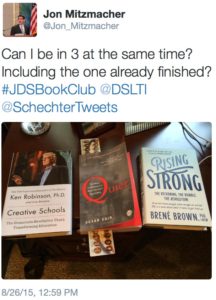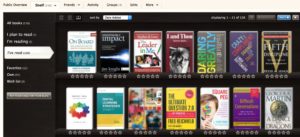There’s always a flurry of excitement – particularly in the bibliophilic circles of Jewish education – when the next book that we are supposed to read comes out. I’m as guilty as anyone else. Exhibit A: 
We are usually not content to just be excited about our books, we want a way to demonstrate that excitement and be part of a community equally excited. There are lots of ways that folk do that. Exhibit B: If you glance down to the bottom, righthand corner of this blog, for example, I am happy to share with you my Shelfari so you, too, can know what I am reading and maybe you might find a book you would enjoy as well.
 When I go to conferences or other professional development experiences, what notes I do take wind up being lists of books and blogs that I hope to read if I have been inspired by the the learning. I look to my mentors, my colleagues, my social media, and my listservs to see what they are reading so I can read it too.
When I go to conferences or other professional development experiences, what notes I do take wind up being lists of books and blogs that I hope to read if I have been inspired by the the learning. I look to my mentors, my colleagues, my social media, and my listservs to see what they are reading so I can read it too.
If you are reading this blog, the odds are pretty decent you engage in similar behavior and have a stack of books (physical, virtual, or both) awaiting your attention.
But let’s say, through some miracle confluence of work efficiency, family harmony and unicorn dust, that you actually find the time to read that blog, article, journal, or book.
What then?
The question I am interested in exploring is, how do we take what we read professionally and apply it to our practice?
I am confident that what you consider your “practice” changes the question. How a classroom teacher applies his professional reading to practice will be different than how a head of school applies her professional reading to practice. Recognizing the great variability in what people read and their job descriptions, I want to lay out a few ways that people try to get from here to there.
The Book Club
Whether the chardonnay-sipping-the-book-is-simply-an-excuse-to-get-the-gang-together or the annotated-notes-outside-facilitated type, whether in person or virtual, one tried and true way to translate theory to practice is to form, lead or participate in some kind of “book club”. I have (and still am) been in them all. I have required teachers to be in them with formal protocols for participation. I have been in voluntary ones with folk across the wide world. The efficacy of the book club experience is entirely dependent, in my experience, on the expectation of a deliverable.
I think “book clubs” are tremendously motivating for people and have the highest odds of getting people to “read the book”. But then what? Are there expectations for the reading? Are there questions to answer? Applications to work expected?
Collaborative Note-Taking
There are lots of way that folk do this presently. Anything from Evernote to GoogleDocs to TwitterChats (and a million more too many to list) all represent opportunities to share notes about a reading experience with lots and lots of people. What you lose in intimacy might be gained in having a permanent record easily organized. What you lose in motivation might be gained in the forced reflection of putting pen to paper (or more realistically keystroke to screen). Ease of annotation via ebooks makes collaborative note-taking simpler than ever…
…with the caveat that the odds are the only time you have to read is on Shabbat and holidays which render ebooks problematic for many of us.
The Book “Report”
Here, I mean simply that there is an expectation of applied practice which is shared. There are tons of examples to choose from. I have seen schools where teachers are expected to present at faculty meetings about the impact of their professional reading. These presentations can range from the least formal (speed-geeking, think-pair-share, etc.) to super formal (PowerPoint, Prezi, etc.) with lots of room for creativity (mini TED-style talks, hatzatah, etc.) in between. This is the most labor-intensive, but likely forces theory into practice most effectively.
As we collectively finish welcoming the rest of schools back to session in the weeks ahead, as life conspires against our best intentions with regard to professional reading, here’s hoping your stack of books is not simply consumed, but impactful. I look forward to learning with you and from you in the year to come.
First glass of wine is on me.
